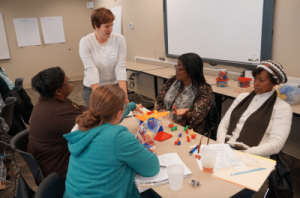PNC Foundation awards $50,000 to support early mathematics learning
June 17, 2015CLEMSON, SC – The PNC Foundation has awarded a $50,000 grant to Project BEEMS (Building Environments for Early Mathematics Success), a Clemson University program that seeks to provide child care teachers and home-based caregivers with skills that support mathematics learning among young children.
The project will include professional development, classroom site and home visits and a period of feedback and reflection, said Sandra Linder, project director and associate professor of early childhood mathematics education at Clemson’s Eugene T. Moore School of Education.
“Pre-k teacher development is a critical component to help young children learn strong math skills,” said Weston Andress, regional president for PNC’s Western Carolina market. “Our support of Project BEEMS is a strategic investment to assist children with analytical skills and problem solving and addresses the changing needs of an economy that is increasingly based on knowledge and skills.”
Researchers will work with teachers and caregivers to build positive and effective mathematics environments, Linder said. Among the topics to be covered are developing learning spaces, introducing mathematical talk during daily routines and modeling play-based math interactions.
“We will be seeking to find out if these initiatives increase young children’s understanding of early mathematics, and also if they affect the dispositions that children, teachers and caregivers have toward math,” Linder said.
The overarching goal of Project BEEMS is to implement an early childhood mathematics professional development model across the state and nation, Linder said. The project will focus specifically on supporting young children in the transition between pre-school age (birth- age 5) and school age (kindergarten and beyond).
The first year of Project BEEMS (also funded by the PNC Foundation for $45,000 in 2013-2014) took place in 12 Head Start centers and had very positive results, Linder said. The current project, to take place during 2015-2016, will focus on general child care settings and home settings by working with child care centers that have scholarships in place for children in an effort to continue to work with traditionally marginalized communities.
Research indicates that positive learning experiences during the early years of life are important for school and life success, Linder said. Forming an early mathematical understanding can be particularly helpful in establishing problem-solving and communication skills.
“The project is part of the Eugene T. Moore School of Education’s continuing focus on systematically improving education and an example of the school’s commitment to underserved communities,” said George J. Petersen, founding dean of the Eugene T. Moore School of Education. “We are proud and thankful to be partnering with the PNC Foundation on this project.”
The PNC Foundation grant is part of Clemson’s The Will to Lead capital campaign to raise $1 billion to support Clemson students and faculty with scholarships, professorships, facilities, technology and enhanced opportunities for learning and research.
PNC Foundation
The PNC Foundation, which receives its principal funding from The PNC Financial Services Group (NYSE: PNC), actively supports organizations that provide services for the benefit of communities in which it has a significant presence. The foundation focuses its philanthropic mission on early childhood education and community and economic development, which includes the arts and culture. Through Grow Up Great, its signature cause that began in 2004, PNC has created a $350 million, multi-year initiative to help prepare children from birth to age 5 for success in school and life.
Eugene T. Moore School of Education
Part of Clemson University, a top-20 public university, the Eugene T. Moore School of Education is a transformative leader in systemically improving education beginning at birth. Its mission is to engage students in high-quality applied research, professional learning and immersive experiences, and to prepare culturally competent scholar practitioners who promote the growth, education and development of all individuals, with emphasis on underperforming schools and underserved communities across the state and nation.





















